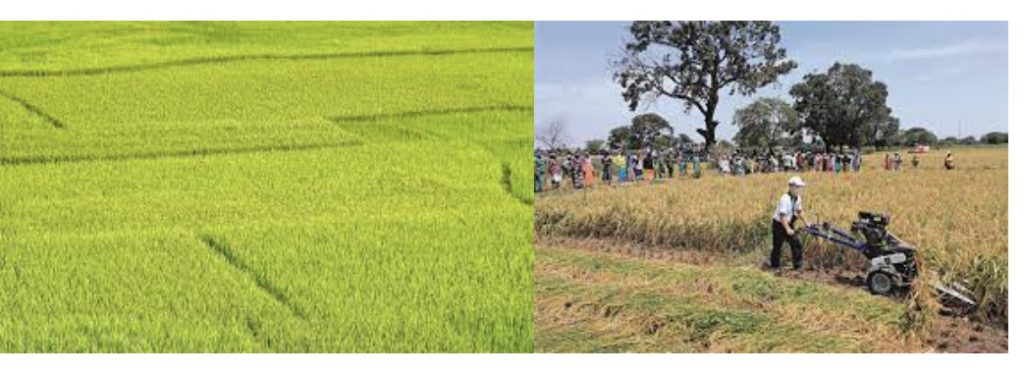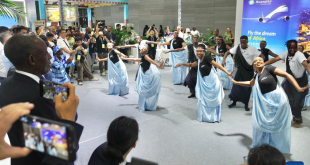Published: July 03,2023

Since growing hybrid rice from China in 2017, Dina’s family living in Mahitsy, a town 35 km northwest of Madagascar’s capital Antananarivo, has not only been able to feed themselves, but also saved enough money to build a new house and finance three college students.
“This year has seen the best harvest. Chinese experts have been very responsible, teaching us techniques and knowledge to help us increase production,” said the 44-year-old woman.
Hu Yuefang, from the Hunan Academy of Agricultural Sciences, is one of the experts Dina talked about.
Hu arrived in Madagascar a year after China and the country launched a cooperation project on growing hybrid rice in 2007, and has been working there ever since, doing research on hybrid rice varieties suitable for local conditions.
“Rice is an important crop in Madagascar. Due to factors such as technological and infrastructure backwardness, the country’s rice production was not able to fully meet the needs of its population,” said Hu.
In order to find the hybrid rice varieties most suited to local conditions, Hu and his team visited almost all rice-growing areas of the island country.
So far, the total hybrid rice growing area in Madagascar has exceeded 50,000 hectares, with an average yield of some 7.5 tonnes per hectare. Hybrid rice varieties developed with Chinese expertise have an average yield two to three times higher than local varieties.
Life in Ninga, a small village in Bubanza Province in northwestern Burundi, has also changed with the help of Chinese expertise over the last five years.
In 2018, a group of Chinese experts came to the village and guided 134 households in large-scale demonstration production of hybrid rice. And now, the village has successfully cultivated eight seasons, with a cumulative planting area of 380.64 hectares, a total yield of 4,104 tonnes, and a net income of 1.32 million U.S. dollars.
Chinese agricultural experts have helped Burundi achieve many successes, particularly in the introduction of hybrid rice, said Diomede Ndayirukiye, director general of the Territory Planning, Irrigation and Heritage Protection at Burundi’s Ministry of Environment, Agriculture, and Livestock.
“Thanks to the Chinese technology, our rice production has increased from 3-4 tonnes per hectare to 10-11 tonnes,” Ndayirukiye said.
Currently, more than 20 African countries are cultivating hybrid rice, and China continues to provide technological support to those countries to increase their hybrid rice output.
Yuan Longping High-tech Agriculture Co., Ltd. (LPHT), dedicated to promoting hybrid rice worldwide, has implemented 179 foreign aid training programs since the 1990s. “Africa is a key region for our technological assistance,” said Chen Xiaoliang, planning manager of LPHT’s foreign aid training department.
From 2020 to 2022, the LPHT held 24 agricultural training sessions for Africa, with a total of 977 participants. To ensure the continuity of agricultural assistance to Africa during the COVID-19 pandemic, the LPHT helped some African countries set up online agricultural training platforms and provided translators for different languages.
Meanwhile, with an aim to draw on China’s hybrid rice technology to help Africa achieve the goal of eradicating hunger and ensuring food security, the China National Hybrid Rice Research and Development Center officially inaugurated its Africa sub-center in Madagascar in May 2019.
The Africa sub-center focuses on developing and promoting hybrid rice varieties suitable for local needs while providing training to local farmers on advanced expertise, said Zhang Lijun, executive director of the sub-center.
After three years of disruption caused by the COVID-19 pandemic, exchanges between China and African countries in the field of hybrid rice are returning to normal.
At the third China-Africa Economic and Trade Expo being held in Changsha, capital city of central China’s Hunan Province, more African countries are eyeing opportunities to advance agricultural cooperation with China.
“Many African countries have already made appointments with us in advance,” said Wei Ran, director of international cooperation at the Hunan Hybrid Rice Research Center, adding that agricultural ministers and ambassadors from various African countries, including Malawi and Egypt, have contacted the center for more guidance on local hybrid rice planting.
China has always been committed to helping Africa develop and alleviate poverty, said TahianaRazanamahefa, director of communication and public relations of the company Societe Trading de l’OceanIndien, which has been collaborating with the Chinese side in promoting hybrid rice in Madagascar.
“We hope to engage in more cooperation with China in the fields of agricultural mechanization, hybrid rice seed production, and others,” she said.
Xinhua
 Africa -China Review Africa -China Cooperation and Transformation
Africa -China Review Africa -China Cooperation and Transformation
